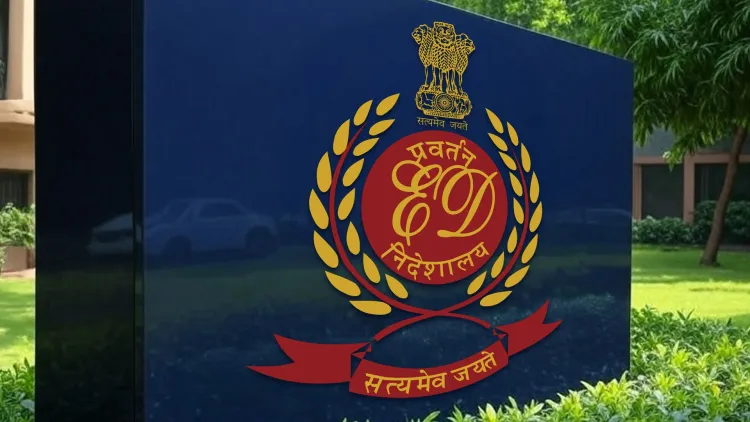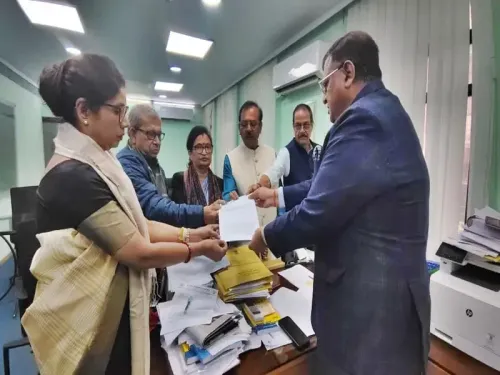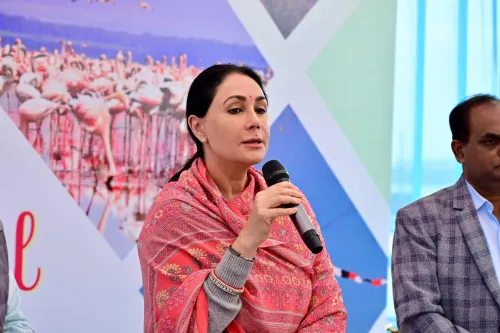Who is the Key Accused in the K’taka Double Compensation Scam?

Synopsis
Key Takeaways
- The ED has arrested Ravi Yallappa Kurbett, a key figure in the double compensation scam.
- Evidence indicates a well-organized scheme involving multiple parties.
- Fake identities were used to claim compensation from KIADB.
- Approximately Rs 46 crore was fraudulently withdrawn.
- The case highlights serious issues of corruption within public institutions.
Bengaluru, July 10 (NationPress) The Directorate of Enforcement (ED), Bengaluru Zonal Office, has apprehended the principal suspect Ravi Yallappa Kurbett in relation to a double compensation scam linked to the Karnataka Industrial Area Development Board (KIADB), Dharwad, concerning V.D. Sajjan and others, under the provisions of the Prevention of Money Laundering Act (PMLA), 2002, as confirmed by the official statement on Thursday.
The arrest took place on July 8.
The ED disclosed, "This fraudulent scheme was executed by retired Special Land Acquisition Officer, Dharwad V.D. Sajjan, in collaboration with other implicated individuals. The detained individual, Ravi Yallappa Kurbett, was presented before the Court of the 3rd Additional District and Sessions Judge (PMLA), in Mangaluru on August 9. The Court has granted a 7-day remand to the ED."
Evidence and documents gathered during the investigation have suggested Ravi Yallappa Kurbett's significant participation in the elaborate money laundering operation executed at KIADB Dharwad, as stated by the ED.
The ED's inquiry unveiled a sophisticated method utilized by the accused to illegitimately claim and withdraw double compensation from KIADB in the names of individuals who had either already received compensation or were deceased. Ravi Yallappa Kurbett was a central figure in this entire scheme, the statement revealed.
Ravi Yallappa Kurbett has emerged as a primary beneficiary of the Proceeds of Crime (POC) generated from this scam. He allegedly utilized the POC for acquiring real estate both in his name and the names of his relatives, as well as for personal expenditures, according to the ED.
It’s important to note that the ED has already attached properties valued at approximately Rs 13 crore in this case, as per the ED.
Previously, a Prosecution Complaint was submitted against 22 accused individuals in the court of the 3rd Additional District and Sessions Judge, PMLA, 2002, in Mangaluru. The court has acknowledged the complaint, and the case is currently under trial. Further investigations are ongoing, as per the ED.
The ED investigation under PMLA, 2002 has unveiled the tactics employed by the accused to fraudulently obtain and withdraw double compensation from KIADB in the names of individuals who had previously received compensation or were already deceased, the ED stated.
Approximately Rs 46 crore was withdrawn in cash from bank accounts established using fictitious PANs. Tax deducted at the time of cash withdrawal under section 194-N of the IT Act has been credited to these PANs. Such TDS, which constitutes Proceeds of Crime, has now been provisionally attached.
The ED elaborated: “The accused had assumed false identities to withdraw fraudulent compensation in collusion with KIADB officials and bank employees. Applications were made by the accused to the Unique Identification Authority of India (UIDAI) for updating their demographic details such as name, address, and mobile number in the Aadhar database to impersonate legitimate landowners whose land acquisition preliminary notifications were accepted.”
Consequently, fake Aadhar identities mimicking genuine landowners were fabricated. Utilizing these false identities, which were updated Aadhar, fictitious PANs were obtained. These PAN cards were used to establish bank accounts in collaboration with bank officials, as stated by the ED.
Applications were subsequently submitted to KIADB for claiming second-time compensation using these fabricated identities. These illegal second-time compensations were sanctioned by KIADB officials in collusion with the accused. The compensations were credited into the bank accounts opened with fictitious PANs, which were then rapidly withdrawn in cash with the connivance of bank officials, the ED reported.
The illicit compensation acquired through this method was divided among the accused. In several instances, this entire process was executed in the names of deceased landowners who had previously received full and final compensation, the ED disclosed.










